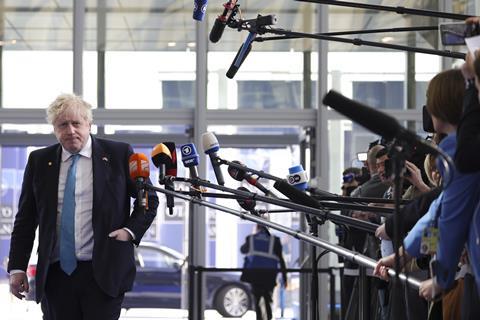I’ve never been Boris Johnson’s greatest fan, but you do have to cut the guy some slack.

He obviously looked forward to finally achieving his goal of being World King and made it to Downing Street. Since then, he’s had to put up with more challenges than most if not all of his recent predecessors.
First came Brexit, which he nearly managed. The small matter of Northern Ireland still remains an open sore, but then along came the pandemic, a once-in-a-century challenge to every nation’s leader across the world.
As it happens, whether by luck or good judgment, England in particular seems to have done rather well, particularly when the comparison is with Wales and Scotland, where the two lefties in charge clearly thought they would shame Boris for unlocking too early when to their dismay he proved right and they proved wrong.
There’s the small matter of Partygate still looming, of course, which is very much unfinished business for many backbench Tory MPs, but just when he assumed he could bluff his way out of that, along comes the prospect of a third world war.
Normally, leaders under pressure see a foreign war as a useful distraction. Several of Boris’s strongest supporters are saying how trivial it is to worry about the odd No 10 party while the world’s going to hell in a handcart.
The massive rise in the cost of energy will hurt poorer families hard
Boris has seen his poll ratings improve as he goes into full sub-Churchillian mode in support of president Zelensky. But will those ratings last as ordinary families now face challenges that many of us thought were dead and buried?
The massive rise in the cost of energy will hurt poorer families hard. The prospect of having to choose between eating or heating is now something many are facing for the first time.
Arguably even more lethal is the impact of inflation. Those of us who are old enough to remember the last time the annual rate got up to 8%, which is where some economists think it will go within months, will know that its impact on the housing market is probably felt more markedly than anywhere else.

As interest rates creep up, more recent borrowers are going to find themselves in difficulty.
At the lower end of the market, in particular among first-time buyers, some will have to hand back the keys if rates go substantially higher.
Prices are surely going to fall at that end of the market. How far this will spread is an open question but the signs are not good.
Long-term sanctions
Assuming even the best outcome in Ukraine, sanctions against Putin’s Russia are likely to be with us for years. We are by no means self-sufficient in energy and although the government is keen to promote renewables, fracking and nuclear are becoming more attractive by the day. A lot of the COP26 rhetoric will just have to be shunted aside.
Many key products will be in short supply and more expensive. All of this is going to mean hard times for many in the next couple of years. The key test is whether, once we have absorbed the inflationary pressures, the annual rate normalises. Frankly, it’s a faint hope. Inflation rises easily and we know from experience is incredibly hard to manage down.
Boris might even have thought the war would push his ratings back into positive territory. But politics isn’t a fair game. Facing rising bills, continued anger over Partygate, the real sense of a government adrift and a Labour Party moving inexorably into Blair territory, if the Met investigation results in so much as a sanction on him personally, he’ll be facing a vote of no confidence.
Then the only question will be whether more than half the Tory MPs vote to remove him. That’s by no means certain, but as Theresa May discovered, even if he wins the skids are certainly under him.
Steve Norris is chairman of Soho Estates and Future-Built





























No comments yet